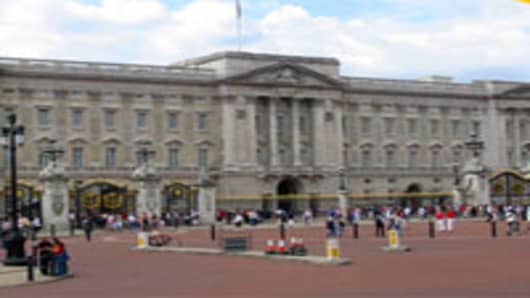Here is a question that is exercising central bankers everywhere, particularly those that have embarked on asset purchase and "quantitative easing" (QE) schemes. What to do with one's billions?
The Bank of England QE program stands at 375 billion pounds ($599 billion). That is a third of the entire U.K. Gilt market. Nice source of credit if one can get it! The Bank's portfolio isn't all comprised of 30-year Gilts though, this week 1.6 billion pounds of the portfolio will mature. Next year the redemption proceeds will be 7.7 billion pounds, and in 2014 and 2015 the maturing cash flows will be 20.9 billion pounds and 23.9 billion pounds. As Lee Van Cleef said in The Good, The Bad and The Ugly, a tidy sum….
This presents an intriguing conundrum. What should the Bank do with the cash? (It is also sitting on about 20 billion pounds in interest payments from its Gilt holdings).
In reality, the most likely course of action for now is that the Bank will reinvest the redemption proceeds into more Gilts, thus preserving the size of QE and thereby giving no indication that it is about to start winding the program down. To do otherwise would be to signal a tightening of monetary policy. The debate only starts to hot up in 2014 and onwards, as the amounts being talked about start to get sizeable.
But there are some more exciting alternatives. One suggestion has been that the Bank cancel its maturing gilts, effectively gifting the cash to HM Treasury. An injection of funds in this way could be used in a more direct neo-Keynesian way to "boost" the economy. Governor King has ruled this out though, on the grounds that an ability to sell, as well as buy Gilts is critical to it maintaining control over monetary policy.
But is this not, to some extent, arguing semantics? QE is a fancy name for printing money. In the 21st century we don't need to "print" money, we can just create it at the click of a mouse button. Perhaps simply canceling debt isn't the best idea, if anything because of the incoherent, undisciplined nature of it. But it is printed money after all, maybe we should look beyond the monetary policy viewpoint?
In the U.S., the Federal Reserve has made substantial payments, comprised partly of interest earnings, to the US Treasury. The BoE could seek to unwind QE when it deems fit by selling gilts to the market, but letting the sums lapse is also one way to unwind and can benefit the nation. That 20 billion pound interest earnings cash pile, could it be used as the basis of a new UK Sovereign Wealth Fund? Maybe that's a luxury the U.K. economy can't afford, so perhaps it could be used as the basis of "infrastructure fund", with a first priority of nationalizing the railways? (Just think what the taxpayer could save, given that what it pays the private train operating companies now dwarfs by many billions over what the old British Rail cost). But if that is too ideologically impure, there are plenty of other worthy infrastructure schemes just waiting to be funded.
These are all suggestions with some worth, because we have an historically unprecedented opportunity to use these electronic billions in a way that provides long term value to the nation. Simply unwinding it seems almost a waste.
_________________________
Professor Moorad Choudhry is Treasurer, Corporate Banking Division, Royal Bank of Scotland.
"The views expressed in this article are an expression of the author's personal views only and do not necessarily reflect the views or policies of The Royal Bank of Scotland Group plc, its subsidiaries or affiliated companies, or its Board of Directors. RBS does not guarantee the accuracy of the data included in this article and accepts no responsibility for any consequence of their use. This article does not constitute an offer or a solicitation of an offer with respect to any particular investment."


